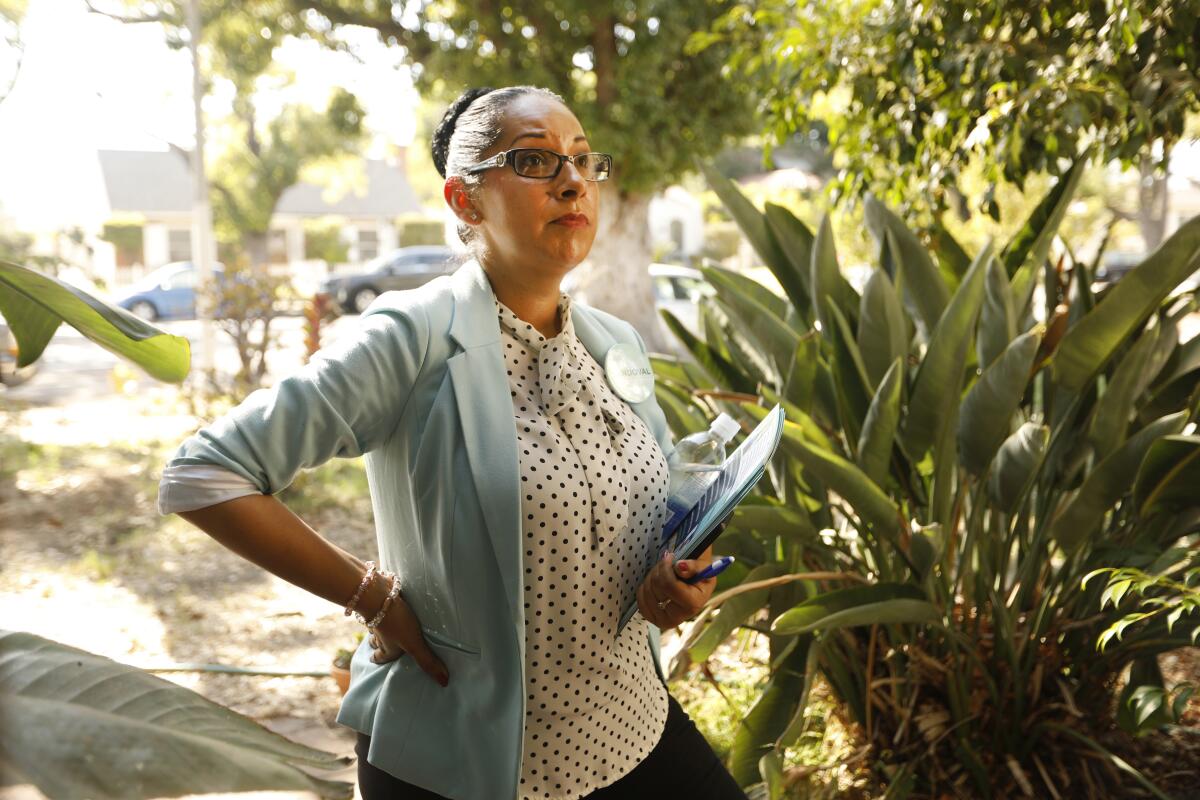L.A. City Council candidate’s former employees accused her business of wage theft

Eight years ago, restaurant worker Jose Higareda filed a wage complaint against the Caliente Cantina restaurant in San Pedro, telling state investigators he was not paid for more than 100 hours of work.
Isaac Garcia, a chef who earned $10 per hour, testified that the same establishment failed to pay him $480 in 2014. Dishwasher and prep cook Jose Flores Esqueda lodged yet another complaint, saying Caliente Cantina did not compensate him for $1,080 worth of work that same year.
All three identified the restaurant’s owner as businesswoman Danielle Sandoval, according to filings in their wage cases, copies of which were reviewed by The Times. Two turned over a text message exchange in which Sandoval, now a candidate for Los Angeles City Council, allegedly acknowledged that they were owed money. A third said he spoke with her directly.
Sandoval “kept giving excuses for not paying,” according to testimony provided by Flores Esqueda in 2015, which was summarized in an order issued by the hearing officer in his case.
The hearing officer, acting on behalf of the state’s labor commissioner, found that the restaurant failed to pay the three workers, committing violations of the state labor code that are commonly known as wage theft, said Paola Laverde, spokeswoman for the state’s Department of Industrial Relations.
Caliente Cantina is now closed, and Sandoval is running in the Nov. 8 election to represent a district stretching from Watts to San Pedro. But the wage claims filed by those three workers, along with a fourth, are still outstanding and have not been paid, Laverde said Thursday.
Rick Caruso and Karen Bass are running for Los Angeles mayor. Here is your guide to the race.
On June 30, three weeks after Sandoval placed second in the June 7 primary election, the nonprofit Wage Justice Center sent two demands for payment to Cantina Investments LLC, a company Sandoval helped form in 2014. The letters said two of those workers are owed a combined $12,271, with the total growing as interest accrues.
“The longer this judgment is left unpaid, the more your company will owe,” wrote the nonprofit group, which is retained by the labor commissioner, whose office investigates wage theft complaints.
The letters were addressed to Cantina Investments LLC, dba Caliente Cantina, c/o Danielle Sandoval.
Sandoval, in an interview, denied engaging in wage theft. Last week, she said she was unaware of the four employees’ claims. She said the restaurant had a company that handled payroll.
“I did not submit any hours. I did not write the schedules. We had supervisors that did all of that. We had a bookkeeper that sent out the bills,” she said.
Sandoval told The Times on Friday that she was the owner of Caliente Cantina. On Monday, she said she was a managing partner. She would not clarify her role with Cantina Investments LLC, saying the company has been dissolved — and that she is now conferring with her lawyer.
“We are looking forward to resolving this as soon as possible,” she said.
State business records from 2014 identify Sandoval as one of two organizers of Cantina Investments LLC, the company listed as the sole defendant in the four wage cases. The other organizer was San Pedro resident Quinn Padilla, who later married Sandoval, according to business and court records.
Both Sandoval and Padilla signed the company’s articles of organization. However, an organizer of an LLC is not necessarily an owner.
Padilla initially told The Times he would be available for a phone call, but later stopped responding to inquiries.
Sandoval would not define the relationship between Cantina Investments and her restaurant. In their filings, state labor officials said Cantina Investments LLC was doing business as Caliente Cantina.
Laverde, spokeswoman for the Department of Industrial Relations, which oversees the office of the labor commissioner, said it can be difficult to collect money from LLCs that are found to have violated state labor laws.
“If warranted, the state would need to conduct additional investigation and bring new legal action in court in order to collect against these entities,” she said.
A state business filing from 2014 also lists Sandoval as the agent for Cantina Investments, which would have made her the company’s contact for legal correspondence. The document said the company had more than one manager but did not identify them.
In 2015, state agencies placed more than $37,000 in liens on Cantina Investments, with nearly a third stemming from the unpaid wages, damages and penalties that were owed in the restaurant’s four wage cases, according to state and county records.
Sandoval accused attorney Tim McOsker, her rival in the council campaign, of carrying out “a political hit job.”
“This is an inside job, a hit job from my opponent,” she said.

McOsker shot back at Sandoval, saying Caliente Cantina’s wage claims were filed several years ago, well before the campaign began. He also pointed out that Sandoval put $37,000 of her own money into her campaign.
That money could have gone to pay the “real people” who were financially harmed while working at Caliente Cantina, McOsker said.
“We need a council member who stands with working families, not one who exploits them,” he said.
Sandoval and McOsker are running to replace Councilman Joe Buscaino in a district that includes the neighborhoods of Wilmington, Harbor City and Harbor Gateway.
Despite being heavily outspent, Sandoval has waged a competitive campaign, picking up endorsements from United Teachers Los Angeles and the editorial board of the Los Angeles Times, which operates separately from the newsroom.
In recent weeks, Councilwoman-elect Eunisses Hernandez, who unseated Councilman Gil Cedillo in June, has urged her supporters to donate to Sandoval’s campaign. City controller candidate Kenneth Mejia has also promoted Sandoval’s council bid. On Sunday, he showed up in San Pedro to knock on doors on behalf of her and other candidates.
Still, the wage theft complaints could slow Sandoval’s momentum, sparking questions about her business background and her commitment to workers.
Sandoval identified herself on the ballot as an entrepreneur and community leader. While campaigning, she has described the difficulties she faced as she opened a restaurant.
“What I found was that our city is not small business friendly,” she told the radio program Valley Views. “By the time you finish opening, you’re already in debt almost $100,000.”
Caliente Cantina opened on 7th Street in San Pedro in 2014 and quickly drew attention. Sandoval appeared on the cover of San Pedro Today, a monthly magazine, along with an article that identified her as the “sole owner” of Caliente Cantina.
That same year, Sandoval highlighted her work at Caliente Cantina while running for a seat on the Central San Pedro Neighborhood Council. In her candidate statement, she described herself as a business owner who had chosen to “re-open and revive a once cherished restaurant.”
Get the lowdown on L.A. politics
Sign up for our L.A. City Hall newsletter to get weekly insights, scoops and analysis.
You may occasionally receive promotional content from the Los Angeles Times.
Sandoval joined the neighborhood council and Caliente Cantina closed soon afterward. The following year, workers at Caliente Cantina appeared at a hearing of the state’s labor commissioner, where they described their experiences.
Garcia, who worked for nearly six weeks as a chef at the restaurant, testified that at one point, Sandoval paid him with a personal check. He submitted a text message exchange in which Sandoval acknowledged that she owed him and Higareda for work they performed, according to the order issued in his case.
Higareda, who earned $10 per hour at the restaurant, reported to investigators that he lost out on 94.5 regular hours of pay and about seven hours of overtime. He also submitted the text exchange, according to the hearing officer’s order.
Flores Esqueda, who worked at the restaurant in July and August 2014, testified that he alerted Sandoval that he had not been paid for 90 hours of work. Sandoval responded by giving excuses, he said.
“One day she told him that she was not going to pay him,” the order said.
No one from Caliente Cantina, including Sandoval, attended the 2015 hearing or provided written responses to the allegations, according to the state’s order. The hearing dealt with civil, not criminal, violations, Laverde said.
Asked about the workers’ claims, Sandoval told The Times that she fired some of her employees for engaging in theft and drug use, but did not provide names.
The Times could not determine if she was describing the employees in the wage theft cases. Sandoval also said the issues faced by Caliente Cantina — such as taxes, permits and “red tape” — show that small businesses “get the short end of the stick.”
“That’s why small business owners are unable to survive,” she said. “I couldn’t even last a year with all the money that I lost.”
More to Read
Sign up for Essential California
The most important California stories and recommendations in your inbox every morning.
You may occasionally receive promotional content from the Los Angeles Times.












